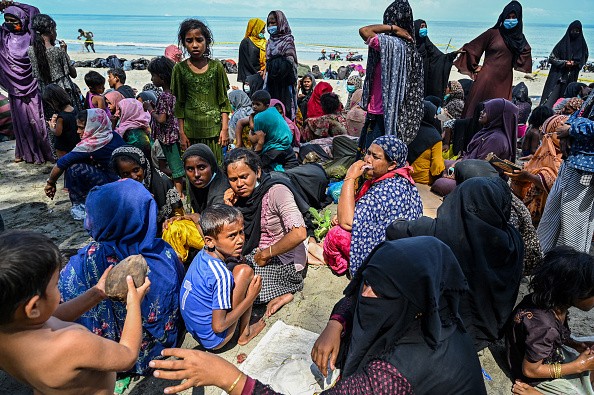On Sunday morning, over 300 Rohingya refugees arrived on the coast of Aceh province in Indonesia after weeks of drifting across the sea from Bangladesh, which prompted tension among the locals.
The survivors, mostly women, children, and men, shared their horrible experiences of running out of supplies and their fear of death at sea as they landed on the unwelcoming shores of the villages of Pidie and Aceh Besar.
Hundreds of Rohingya's Arrival Prompt Tension Among Locals

The first group of 180 refugees arrived by boat at 3 am local time on Saturday at a beach in the Pidie Regency of Aceh province. Shahidul Islam, a 34-year-old survivor, said that their boat was sinking, and they had no food or water left as they left a refugee camp in Bangladesh.
The second boat of 135 refugees landed in neighboring Aceh Besar regency hours after being adrift at sea for more than a month, while a third boat was missing. One refugee said at a shelter on the coast that they wanted to find a safe place as they already knew that they might die at sea. But the refugee shared that finally they were safe and said that was what they all wanted for their children.
Aceh Besar's acting regent, Muhammad Iswanto, confirmed that the refugees were transferred to a temporary shelter during the visit of a United Nations representative on Sunday evening. He said, "They are relocated to the camping ground by the province's [refugee] task force. They will join other Rohingya refugees that have been there."
The tensions have been increasing as the people of Aceh had previously welcomed over 1,500 Rohingya refugees who have arrived in Indonesia since last month. The residents in Aceh were against providing funds, supplies, or shelter for the Rohingya refugees. Furthermore, they do not want the refugees to stay in the area.
The local government in Pidie said they would not take responsibility for providing the refugees with tents or other basic needs or supporting any expenses.
Rijalul Fitri, head of Blang Raya village in Aceh, said they do not want the refugees in their village. He shared that they stayed up all night to prevent the refugees from dock, but they still arrived.
Over 100 protesters in Sabang Island in Aceh had a conflict with the police as they called for the Rohingya refugees' relocation. A woman said, "We are poor people, why don't they use the money to help us? Why are they giving them food?"
Another protester said that they want them to move the Rohingyas as soon as possible as they do not want to catch the diseases they carry.
UN Refugee Agency's Response
The UN refugee agency's protection associate, Faisal Rahman, said the organization has been trying to reassure the local communities. He said they continue to explain the situation to the people and ensure they would not be burdened with handling refugees.
Rahman added that the government was working harder to provide shelter as the number of refugees increased. Indonesian President Joko Widodo said they would temporarily relieve the refugees on Friday, prioritizing the local community's interests.
Al Jazeera correspondent Jessica Washington reported that Indonesia's government was looking for a new site to house the refugees and has acknowledged residents' opposition to finding a sustainable solution.
Furthermore, the UN said the difficult conditions and increase in crime in Bangladesh, as well as the worsening crisis in Myanmar, was the reason for the rise in the flow of refugees. The experts have predicted that more boats could arrive in the coming months.
Emily Bojovic of the UN refugee agency's Southeast Asia office said around 75 percent of the new arrivals were women and children.
Related Article : Australia Releases Stateless Rohingya Man, Urges 6 Countries To Resettle After High Court Challenge








